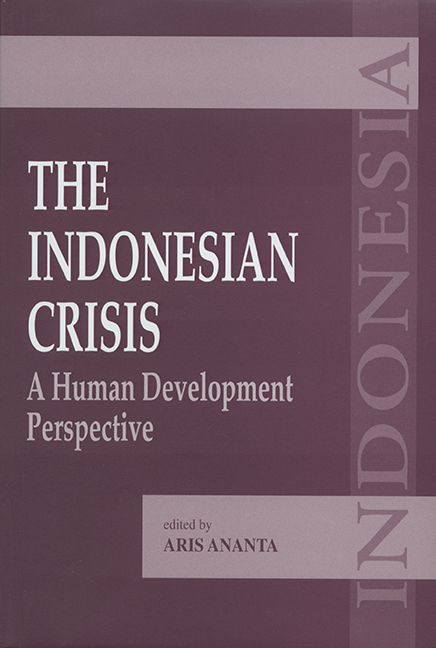Book contents
- Frontmatter
- Contents
- Acknowledgements
- List of Contributors
- Part I Introduction
- Part II Human Capital
- Part III Purchasing Power
- Part IV Emerging Issues
- 13 Political Economy of Business Relations between Indonesia and Singapore
- 14 Drug Abuse in Indonesia: An Increasing Problem During the Economic Crisis
- 15 Managing the Elderly in a Crisis Situation
- 16 The Indonesian Crisis in an Alternative Perspective: Views from Outer Indonesia
- Index
14 - Drug Abuse in Indonesia: An Increasing Problem During the Economic Crisis
from Part IV - Emerging Issues
Published online by Cambridge University Press: 21 October 2015
- Frontmatter
- Contents
- Acknowledgements
- List of Contributors
- Part I Introduction
- Part II Human Capital
- Part III Purchasing Power
- Part IV Emerging Issues
- 13 Political Economy of Business Relations between Indonesia and Singapore
- 14 Drug Abuse in Indonesia: An Increasing Problem During the Economic Crisis
- 15 Managing the Elderly in a Crisis Situation
- 16 The Indonesian Crisis in an Alternative Perspective: Views from Outer Indonesia
- Index
Summary
Introduction
Indonesia is in the midst of a full-blown drug abuse and addiction crisis. From being practically unheard of in the past decade, drug abuse has suddenly become a major problem in the country. Years of denial with regard to drug abuse problems in Indonesia, or more importantly, reports that never stated the truth about the drug problem, have cost Indonesia much in more ways than one.
With an estimated 1.3 million drug abusers and addicts in the country in the year 2000, Indonesia has more than it can intelligently and effectively handle. Still debilitated by the pressures of the economic crisis and increasing poverty, as well as ongoing political problems, the issue of drug abuse has to compete with many other issues occupying the minds of the government and the masses. On the other hand, addiction and the economic crisis have lured people into the lucrative drug business.
Problems related to drug abuse and addiction have definitely increased the incidence of HIV/AIDS, Hepatitis C, economic problems, crime, and violence in the country. The lives of millions of families have been affected by these problems. They have become dysfunctional, with most of them not knowing what to do or where to go to seek qualified help. Indonesia has also seen a steady increase in violent student brawls, bloody and senseless riots, and an increasing crime rate, worsening within these past few years, escalating with the problem of drug abuse and addiction. Unfortunately, all these problems will continue to escalate unless the country takes a firm stand against drug abuse.
However, the system of control has not been set up properly, and it is still in its infancy. Indonesia failed to carry out any effective drug abuse prevention programmes when it mattered most, and now it is too late for prevention. Money had been wasted in the past, and now Indonesia has to stretch whatever resources it has to deal with this now monstrous issue. The need for firm intervention is crucial.
The biggest problem is that many people in Indonesia, including professionals, are mostly ignorant about the strategies needed to battle these problems. Most are still calling for intervention to reduce supply only, with the naive expectation that a reduction in drug supply will stop the people from using and abusing drugs.
- Type
- Chapter
- Information
- The Indonesian CrisisA Human Development Perspective, pp. 362 - 381Publisher: ISEAS–Yusof Ishak InstitutePrint publication year: 2002

